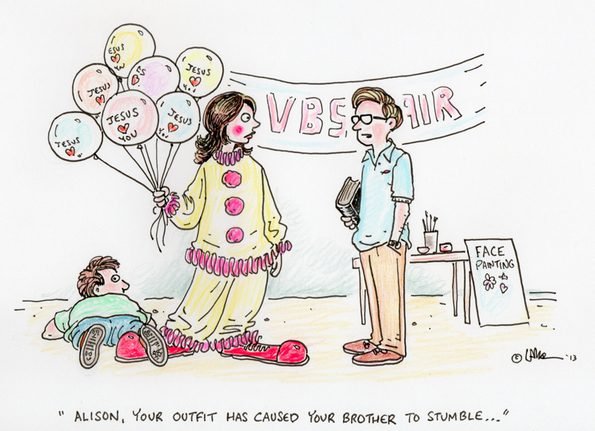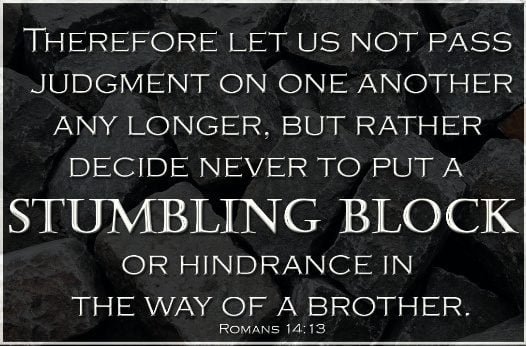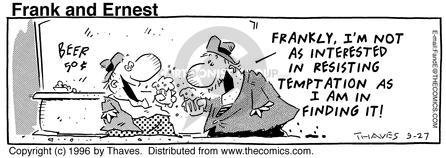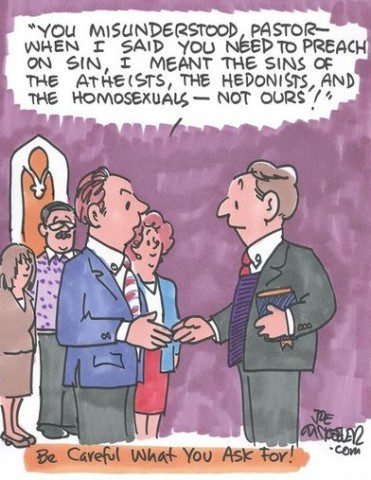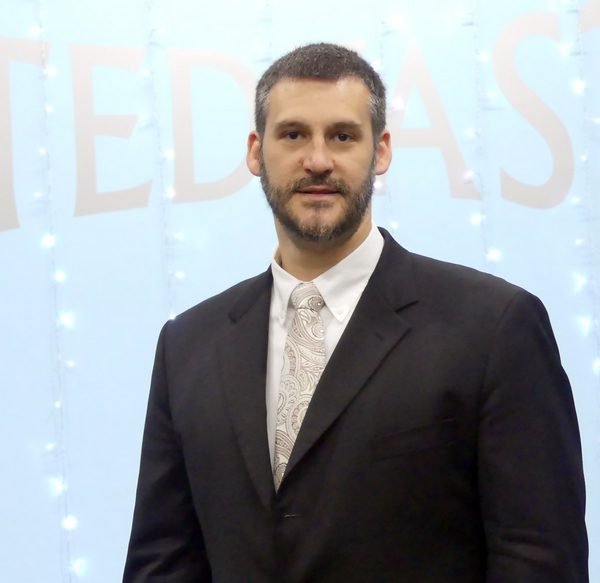
Repost from 2015. Edited, rewritten, and corrected.
Several years ago, Ewan asked:
Do you have a philosophical view of the word ‘sin” anymore?
How is homosexuality defined in your worldview? What of extramarital sexual relationships? or premarital? Are they ‘sin’?
What is an atheistic view of sin? Does it really matter? If there is no sinful behaviour, where does guilt come from?
The power of sin in a Christian worldview is guilt. If I were to have an extramarital affair built on love, is this sinful? What the heck is ‘sin’?
I do not use the word sin in defining certain human behaviors. Sin is inherently a religious term, and since I am not a religious person, I have no need for the word and its theological consequences. Based on cultural and societal norms, humans act in ways that are considered good, indifferent, or bad. What we consider good, bad, or indifferent behavior changes with time, circumstance, and place. Currently, these things are still deeply influenced by religion, yet religion is losing its primacy and this is why we see religious zealots raging against perceived sins and slights of God and his supposedly timeless moral code.
Homosexuality is a scientific term, a word used to describe same-sex attraction. It has no inherent moral quality. Once we remove religion from the discussion, there is less need to concern ourselves with sexual attraction or whom someone marries.
Marriage is a contractual agreement between two people. If this contract includes a commitment to monogamy, then I would consider it bad behavior to commit adultery. However, many people marry for reasons other than sex. I pastored a few couples over the years who had sexless marriages. One woman thought sex was for having children. Once her children were born, she was done with having sex, and she had no problem with her husband seeking sexual gratification elsewhere.
When it comes to premarital sex, I see no reason to consider it bad behavior. We have laws that govern the age of consent, and as long as the sex is consensual, I see no reason to demonize teenagers and young adults for acting on (and enjoying) their biological needs and urges. Our goal should be to make sure every person receives state-mandated, science-based education about human sexuality and birth control. The overwhelming majority of teenagers engage in premarital sexual activity, so it is in everyone’s best interest to make sure teens are properly educated and on birth control until they are ready to have children. Doing so would greatly reduce the number of unwanted pregnancies, a goal all of us support.
There is no atheist position on sin. Atheism is a belief about the existence of deities, not a statement about ethics or morality. It is humanism that gives many atheists, including myself, a moral and ethical framework. The Humanist Manifesto III states:
Humanism is a progressive philosophy of life that, without supernaturalism, affirms our ability and responsibility to lead ethical lives of personal fulfillment that aspire to the greater good of humanity.
The lifestance of Humanism—guided by reason, inspired by compassion, and informed by experience—encourages us to live life well and fully. It evolved through the ages and continues to develop through the efforts of thoughtful people who recognize that values and ideals, however carefully wrought, are subject to change as our knowledge and understandings advance.
This document is part of an ongoing effort to manifest in clear and positive terms the conceptual boundaries of Humanism, not what we must believe but a consensus of what we do believe. It is in this sense that we affirm the following:
Knowledge of the world is derived by observation, experimentation, and rational analysis. Humanists find that science is the best method for determining this knowledge as well as for solving problems and developing beneficial technologies. We also recognize the value of new departures in thought, the arts, and inner experience—each subject to analysis by critical intelligence.
Humans are an integral part of nature, the result of unguided evolutionary change. Humanists recognize nature as self-existing. We accept our life as all and enough, distinguishing things as they are from things as we might wish or imagine them to be. We welcome the challenges of the future, and are drawn to and undaunted by the yet to be known.
Ethical values are derived from human need and interest as tested by experience. Humanists ground values in human welfare shaped by human circumstances, interests, and concerns and extended to the global ecosystem and beyond. We are committed to treating each person as having inherent worth and dignity, and to making informed choices in a context of freedom consonant with responsibility.
Life’s fulfillment emerges from individual participation in the service of humane ideals. We aim for our fullest possible development and animate our lives with a deep sense of purpose, finding wonder and awe in the joys and beauties of human existence, its challenges and tragedies, and even in the inevitability and finality of death. Humanists rely on the rich heritage of human culture and the lifestance of Humanism to provide comfort in times of want and encouragement in times of plenty.
Humans are social by nature and find meaning in relationships. Humanists long for and strive toward a world of mutual care and concern, free of cruelty and its consequences, where differences are resolved cooperatively without resorting to violence. The joining of individuality with interdependence enriches our lives, encourages us to enrich the lives of others, and inspires hope of attaining peace, justice, and opportunity for all.
Working to benefit society maximizes individual happiness. Progressive cultures have worked to free humanity from the brutalities of mere survival and to reduce suffering, improve society, and develop global community. We seek to minimize the inequities of circumstance and ability, and we support a just distribution of nature’s resources and the fruits of human effort so that as many as possible can enjoy a good life.
Humanists are concerned for the well being of all, are committed to diversity, and respect those of differing yet humane views. We work to uphold the equal enjoyment of human rights and civil liberties in an open, secular society and maintain it is a civic duty to participate in the democratic process and a planetary duty to protect nature’s integrity, diversity, and beauty in a secure, sustainable manner.
Thus engaged in the flow of life, we aspire to this vision with the informed conviction that humanity has the ability to progress toward its highest ideals. The responsibility for our lives and the kind of world in which we live is ours and ours alone.
(If I have a “religion” it is secular humanism. My religion’s code is summarized in the Humanist Manifesto.)
The question of guilt is a good one, one that I am not sure I can adequately answer. Some guilt is driven by the pervasiveness of religion and its sin-punishment-reward system. However, I think guilt also flows from being a part of a particular culture and tribe. I am sure there are some behaviors that elicit guilt among my children that might not cause guilt in a different family’s children. Guilt, as with morality, can be, and is, quite subjective.
The more absolute one’s moral beliefs are, the more likely one is to feel guilt. As I have stated many times before, my sin (bad behavior) list now fits on a 3×5 card, and I suspect by the time I die it will fit on a post-it note. Once the church, the Bible, and sin-loving — yet sin-hating — preachers are removed from the equation, guilt often assuages. In other words, remove religion from a person’s life, and guilt levels recede. Pretty good reason for ditching Christianity, don’t you think?
I grew up believing drinking alcohol was a sin. I was fifty years old before I took my first drink. Now that God and the Bible no longer factor into my moral and ethical beliefs, I am free to drink alcohol, as much or as little as I want. In the past, I have spent time with friends who love to drink. While I didn’t drink as much alcohol as they did, I did drink some and I thoroughly enjoyed it, as did my wife. At no time did I have a twinge of guilt over drinking the devil’s brew. I drank responsibly, and acted in a way that did not harm others; no sin, no guilt.
What atheism and humanism have given me is personal autonomy and freedom. And a very small sin list.
Bruce Gerencser, 68, lives in rural Northwest Ohio with his wife of 47 years. He and his wife have six grown children and sixteen grandchildren. Bruce pastored Evangelical churches for twenty-five years in Ohio, Texas, and Michigan. Bruce left the ministry in 2005, and in 2008 he left Christianity. Bruce is now a humanist and an atheist.
Your comments are welcome and appreciated. All first-time comments are moderated. Please read the commenting rules before commenting.
You can email Bruce via the Contact Form.

